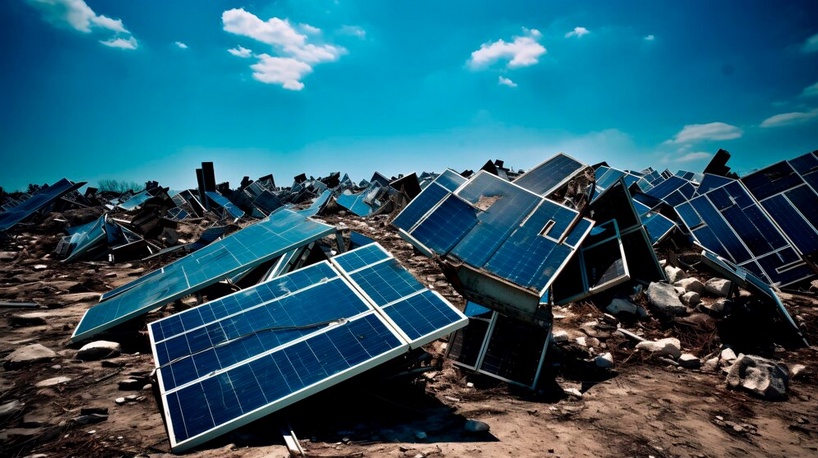Solar energy has been hailed as one of the most promising solutions to combat climate change and transition to a more sustainable energy future. Solar panels, also known as photovoltaic (PV) panels, have become increasingly popular, both in residential and commercial applications, as a means of harnessing clean and renewable energy from the sun. While the adoption of solar panels is undoubtedly a positive step towards reducing greenhouse gas emissions, there is a growing concern that often goes unnoticed: the issue of solar panel waste. This article explores the emerging concern of solar panel waste, its implications, and what individuals and industries need to know to address this environmental challenge.
The Solar Boom and Its Consequences
The global solar industry has experienced remarkable growth in recent years. Falling costs, government incentives, and increased environmental awareness have driven a surge in solar panel installations. This growth has undoubtedly contributed to reducing carbon emissions and dependence on fossil fuels. However, as the number of solar panels in use continues to rise, so does the amount of solar panel waste generated.
Understanding Solar Panel Lifespan
Solar panels are designed to be durable and long-lasting, with an average lifespan of 25 to 30 years or more. This longevity is a key selling point for solar technology, as it allows for a reasonable return on investment. However, it also means that the retirement of solar panels occurs over an extended period, leading to a gradual accumulation of decommissioned panels.
The Challenge of Solar Panel Waste
The challenge of solar panel waste arises when these panels reach the end of their operational life or become damaged and need to be replaced. Solar panels contain various materials, including semiconductor materials like silicon, metal frames, and glass, all of which are non-biodegradable and pose challenges for disposal. There are several key factors contributing to the concern of solar panel waste:
-
Volume: The sheer volume of solar panels being installed globally translates into a significant amount of waste when these panels reach the end of their life. This waste stream will continue to grow as the industry expands.
-
Toxic Materials: While solar panels are not classified as hazardous waste, they do contain small amounts of potentially toxic materials such as cadmium and lead. If not properly managed, these substances can pose environmental and health risks.
-
Recycling Challenges: Solar panel recycling is still a relatively undeveloped industry, and there is a lack of standardized recycling processes and infrastructure in many regions. This can make it difficult to recycle solar panels efficiently.
-
Economic Viability: The economic viability of recycling solar panels depends on factors such as the cost of transportation, processing, and the value of recovered materials. In some cases, recycling may be economically unfeasible.
The Environmental Impact
Improper disposal of solar panels can have a range of environmental impacts. When discarded in landfills, the materials within the panels can leach toxic substances into the soil and water, posing risks to ecosystems and human health. Additionally, the energy and resources invested in manufacturing solar panels are wasted if recycling opportunities are not pursued, contributing to resource depletion and increased carbon emissions.
Addressing the Issue of Solar Panel Waste
To effectively address the issue of solar panel waste, it is essential for individuals, industries, and policymakers to take proactive steps. Here are some key considerations and potential solutions:
-
Research and Development: Continued research and development efforts are needed to improve the recyclability and sustainability of solar panels. Innovations in panel design, materials, and recycling processes can contribute to a more environmentally friendly industry.
-
Extended Producer Responsibility (EPR): Implementing EPR programs can hold solar panel manufacturers responsible for the end-of-life management of their products. This can incentivize manufacturers to design panels with recyclability in mind and invest in recycling infrastructure.
-
Recycling Infrastructure: Expanding and improving solar panel recycling infrastructure is crucial. This includes developing more efficient methods for collecting, disassembling, and processing old panels.
-
Consumer Awareness: Educating consumers about the importance of proper solar panel disposal and recycling is vital. Encouraging individuals to choose certified recyclers and participate in take-back programs can make a significant difference.
-
Policy and Regulation: Governments and regulatory bodies can play a pivotal role in addressing solar panel waste. Implementing regulations, standards, and incentives that promote recycling and responsible disposal can help manage the issue effectively.
The Circular Economy Approach
One promising approach to tackle the growing concern of solar panel waste is the adoption of a circular economy model. In a circular economy, products are designed, produced, and disposed of with recycling and resource recovery in mind. Solar panel manufacturers can embrace this approach by designing panels for easy disassembly and recycling, thereby minimizing waste and reducing the environmental impact.
Conclusion
While the widespread adoption of solar panels represents a significant step towards a more sustainable energy future, the issue of solar panel waste should not be overlooked. As the industry continues to grow, the accumulation of retired panels poses environmental and resource challenges. It is imperative for individuals, industries, and policymakers to take proactive measures to address this concern.
Efforts to improve recycling infrastructure, promote extended producer responsibility, and raise consumer awareness are all essential components of a comprehensive solution. By embracing the principles of a circular economy and prioritizing responsible disposal and recycling practices, we can mitigate the environmental impact of solar panel waste and ensure that solar energy remains a genuinely sustainable solution for the future.


No comments yet